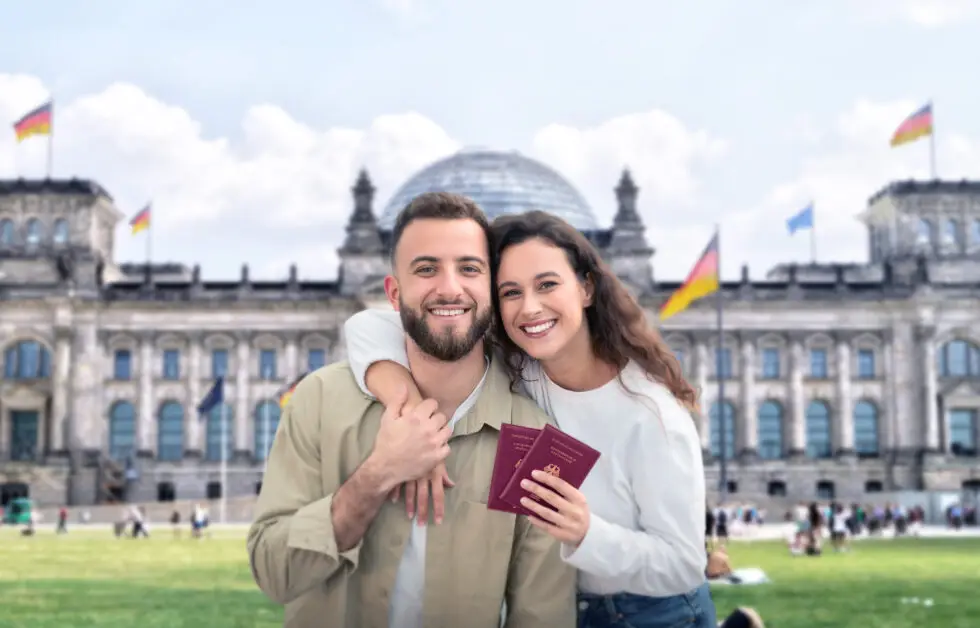What is § 28 AufenthG?
As an introduction, it is important that you understand the meaning and purpose of the residence title § 28 AufenthG. The decisive focus is on family reunification with German family members.
Meaning and purpose of § 28 AufenthG
§ Section 28 (1) of the Residence Act regulates family reunification with German nationals. This provision enables you as a spouse, underage unmarried children and parents of underage Germans to obtain a residence permit.
Your Residence permit for family reunification with Germans is issued in deviation from the normal requirements for a residence permit in accordance with § 5 Para. 1 No. 1 AufenthG. This means that proof that your livelihood must be secured is not a requirement.
If you are the custodial parent of an unmarried German minor, you do not have to prove that you are able to support them if they are already living in Germany.
If you are the spouse of a German citizen, certain requirements from the reunification of spouses according to § 30 AufenthG apply in accordance with § 28 Para. 1 AufenthG. These requirements include that both spouses have reached the age of 18 (para. 1 sentence 1) and that you can communicate with your German spouse in a simple manner (A1 level) in German and that the marital partnership exists.
Advantages of the application
The application of Section 28 AufenthG offers you several advantages, including faster Settlement permit, the requirements of which can be found in Section 28 (2) AufenthG, and the possibility of applying for German citizenship after just three years.

Requirements for applying for Settlement permit in accordance with § 28 AufenthG
To apply for a Settlement permit in accordance with § 28 AufenthG, you must meet certain requirements. These are based on the requirements of Settlement permit in accordance with Section 9 (2) sentences 2 to 5 AufenthG. These are crucial in order to successfully complete the process and build a secure future in Germany.
Securing a livelihood
One of the most important requirements is to be able to support yourself. This means that you must be able to provide for yourself and your family without state assistance. Important. This is a regular requirement for obtaining a residence permit. This means that you as a foreigner must secure your livelihood and the rest of the family does not have to do this additionally.
Here are some points you should bear in mind:
- Proof of income: Salary slips or proof of income for the last few months.
- Job: A permanent job or stable self-employment.
- No claiming of social benefits: You may not receive benefits such as ALG II.
Sufficient language skills
In order to obtain a Settlement permit , you must demonstrate sufficient knowledge of the German language. These language skills are necessary in order to successfully integrate in Germany and participate in social life.
The requirements include:
- Language certificate: At least level B1 of the Common European Framework of Reference for Languages (CEFR).
- Language courses: Participation in integration courses or other recognized language courses.
Proof of integration
Basic knowledge of the legal and social order is not a prerequisite for issuing a residence permit at Settlement permit in accordance with Section 28 AufenthG. Accordingly, they do not need to be proven.

Naturalization after 3 years
With the residence permit according to § 28 AufenthG you have the possibility to in accordance with § 9 StAG to apply for German citizenship after three years. In the following section, you can find out more about the requirements and advantages of Naturalization as well as changes resulting from the introduction of the new Naturalization Act.
Requirements for the Naturalization
In order to apply for German citizenship after three years, you must fulfill the following requirements, which are set out in § 10 StAG:
- Signed declaration of loyalty: You must sign a declaration in which you declare your commitment to the free democratic basic order of the Federal Republic of Germany.
- Securing your livelihood: You must prove that you are able to secure your livelihood without claiming social benefits.
- Successful naturalization test: This test includes questions on the topics of politics, history and society in Germany.
- Clarified identity: Your identity must be established beyond doubt.
- Legal residence in Germany: You must have been legally resident in Germany for at least three years.
- Language skills: The applicant must prove that they have sufficient knowledge of the German language (B1).
- Exemption from punishment: You must not have any serious previous convictions.
Advantages of German citizenship
Naturalization offers you numerous advantages, including
- Political rights: You have the right to vote and can participate in political decisions.
- Freedom of movement: You can move and work freely within the European Union.
- Social security: You have access to all social benefits and security systems in Germany.
- Legal security: As a German citizen, you enjoy the full legal protection and rights of the German state.
- Professional opportunities: You have access to all professions, including those reserved for German citizens.
Changes due to the new Naturalization Act
The new Naturalization Act has been in force since 27 June 2024 and brings with it some important changes:
- Dual citizenship: It is now possible to retain the citizenship of your home country, provided your home country allows dual citizenship. It is no longer necessary to renounce your original citizenship.
- Facilitating the naturalization process: The process has been simplified in order to facilitate access to German citizenship and promote integration.
Naturalization with § 28 AufenthG?
Step-by-step guide to applying for Section 28 AufenthG
To apply for a residence permit in accordance with § 28 AufenthG, you must follow a few important steps. This guide will help you to understand and successfully complete the process.
Required documents
Before you submit your application, you should make sure that you have all the necessary documents ready.
Here is a list of the documents required to obtain a residence permit according to § 28 AufenthG:
- Valid passport: Your current passport or a comparable identity document.
- Marriage certificate or birth certificate: Proof of the family relationship to the German citizen.
- Proof of livelihood: Salary slips or proof of income for the last few months.
- Proof of health insurance: Certificate of valid health insurance.
- Proof of accommodation: rental contract or proof of ownership for sufficient living space.
- Language certificate: Proof of German language skills at least at level A1.
Application procedure
The application for a residence permit according to § 28 AufenthG follows a set procedure. Here are the steps in detail:
- Preparation of documents: Gather all necessary documents and make sure they are complete and up-to-date.
- Entry with a visa: If the entitlement exists abroad. Submit the application at the German embassy in your country of origin. Travel to Germany with the appropriate visa in accordance with § 28 AufenthG
- Make an appointment: If you are in Germany. Make an appointment with the responsible Foreigners' office.
- Application: Submit your application together with the collected documents to Foreigners' office .
- Application fee: Pay the application fee for the initial issue of the eAT. This is 100 euros in accordance with § 45 of the AufenthV (Residence Ordinance).
- Processing the application: The authority will check your application and the documents submitted.
- Feedback from the authority: You will receive feedback on the status of your application and, if necessary, further instructions.
Official visits and appointments
During the application process, you will have to complete several administrative procedures. Here are some important points to bear in mind:
- Collection of documents: If you are applying from abroad, you must collect the documents in order to submit them to the embassy. If you are in Germany, you must submit the documents to your local Foreigners' office .
- Subsequent submission of documents: You may need to submit missing or additional documents.
- Appointment to collect your residence permit: Once your application has been successfully checked and approved, you will receive an appointment to collect your residence permit.
We have summarized all the steps for your application in a table below:
Step | Description |
|---|---|
Preparation of the documents | Collecting and checking all required documents |
Making an appointment | Arrange an appointment at Foreigners' office (if applying from within Germany) or the German embassy in your country of origin (if applying from abroad) |
Application | Submit application and documents |
Application fee | Payment of the processing fee |
Processing of the application | Examination by the authority |
Feedback from the authority | Information about the application status |
Collection of the residence permit | Appointment to collect the documents |
Extension of the residence permit according to § 28 AufenthG
Extending your residence permit in accordance with § 28 AufenthG is an important step towards being able to continue living and working in Germany. In this section you will learn everything you need to know about the requirements and the extension procedure.
Requirements for the extension
In order to successfully extend your residence permit, certain requirements must be met. These requirements include
- Continued family cohabitation: Your family cohabitation with the German national must continue to exist.
- Securing your livelihood: You must continue to prove that you are able to secure your livelihood without claiming social benefits.
- Valid health insurance: Proof of valid health insurance.
- No criminal offenses: There must be no serious criminal offenses that could jeopardize an extension of the residence permit.
Expiry of the extension procedure
The process of renewing your residence permit follows a clear procedure. Here are the steps in detail:
Step 1: Early preparation: Start preparing all the necessary documents in good time. Make sure that all documents are up-to-date and complete.
Step 2: Submission of documents: Submit all required documents, including:
- Valid passport
- Proof of continued family cohabitation
- Proof of livelihood
- Proof of health insurance
Step 3: Review by the authority: The Foreigners' office checks your application and the documents submitted. If necessary, you will be asked to submit further documents.
Step 4: Feedback and appointment for collection: Once your application has been successfully checked, you will receive feedback on the status of your application. If the extension is approved, you will be given an appointment to collect your new residence permit.
Frequent difficulties and solutions with § 28 AufenthG
Applying for a residence permit in accordance with Section 28 AufenthG can present a number of challenges. It is important to be aware of these difficulties and to know strategies for avoiding rejections. This section deals with typical difficulties in the application process and helpful tips for avoiding rejections.
Typical difficulties with the application
Various problems can arise when applying for a residence permit in accordance with § 28 AufenthG. Here are some of the most common difficulties:
- Incomplete documents: One of the most common reasons for delays or rejections is incomplete or missing documents.
- Insufficient language skills: Insufficient knowledge of German can have a negative impact on the application process.
- Lack of proof of livelihood: If proof of livelihood cannot be provided, this may lead to rejection.
- Complicated administrative procedures: The process can be made more difficult by lengthy and complicated administrative procedures.
- Misunderstandings regarding the requirements: Ambiguities or misunderstandings about the exact requirements can lead to errors in the application.
Tips for avoiding rejections under Section 28 AufenthG
To make the application process successful and avoid rejections, you should follow these tips:
- Prepare documents carefully: Make sure that you submit all required documents completely and up-to-date. Use checklists to keep an overview.
- Prove your language skills: Prepare well for language tests and make sure you can prove that you have the required language level.
- Proof of livelihood: Gather all relevant proof of income and make sure it is up to date and accurate.
- Make an appointment in good time: Make an appointment in good time at Foreigners' office or at the German embassy (if you are applying from abroad) to avoid long waiting times.
- Take advantage of advice: Use the support of consultants or lawyers who specialize in residence law to avoid mistakes and speed up the process.
- Plan visits to the authorities well: Plan enough time for visits to the authorities and prepare well for appointments.
- Check information regularly: Find out regularly about the latest changes in legal regulations to ensure you are always up to date.
Conclusion
As you can see, the topic of Section 28 AufenthG is very complex. We have summarized the most important points for you here and looked ahead to the future with your Residence permit .
Summary of the most important points.
Important points on § 28 AufenthG include:
- Securing your livelihood
- Proof of sufficient knowledge of German
- Continuing family cohabitation
- The Settlement permit process is faster than with other residence permits
- The Naturalization can be used after 3 years of legal residence in Germany.
Outlook
The new Naturalization Act, which has been in force since 27 June 2024, will further simplify Naturalization in Germany, in particular through the possibility of dual citizenship. This offers you the opportunity to secure your long-term future in Germany without having to give up your original citizenship. It is advisable to keep up to date with legal changes and seek professional advice if necessary to make the process as smooth as possible.

The requirements for Naturalization are very important. In this article, we explain which requirements are important and why these conditions are crucial. So you are well informed about the Naturalization and can start your way to your successful Naturalization !
FAQ - The most important questions about § 28 AufenthG
§ Section 28 of the Residence Act regulates family reunification with German nationals. This enables spouses, underage unmarried children and parents of underage Germans to obtain a residence permit in Germany.
To apply for Section 28 AufenthG, you must make an appointment with the German embassy in your country of origin (if you are applying from abroad) or the relevant Foreigners' office (if you are in Germany) and submit all the necessary documents there. This includes proof of family relationship, livelihood, language skills and other required documents.
The requirements include:
- Entry with the appropriate visa or exemptions (if you are applying from abroad)
- Proof of family relationship to a German citizen
- Securing a livelihood without social benefits
- Sufficient knowledge of German (at least A1)
- Valid health insurance
- No serious criminal offenses
With a residence permit in accordance with § 28 AufenthG, you can apply for German citizenship after three years, provided you meet the requirements in accordance with § 10 StAG. These include proof of livelihood, sufficient knowledge of German (B1) and passing the naturalization test.
A Settlement permit in accordance with § 28 AufenthG can generally be issued after three years if the family partnership continues, sufficient knowledge of German can be demonstrated and there are no grounds for deportation.
Yes, you can extend the Residence permit as long as the family partnership continues to exist, you are able to support yourself and are free of criminal convictions. The extension application must be submitted to Foreigners' office in good time.








